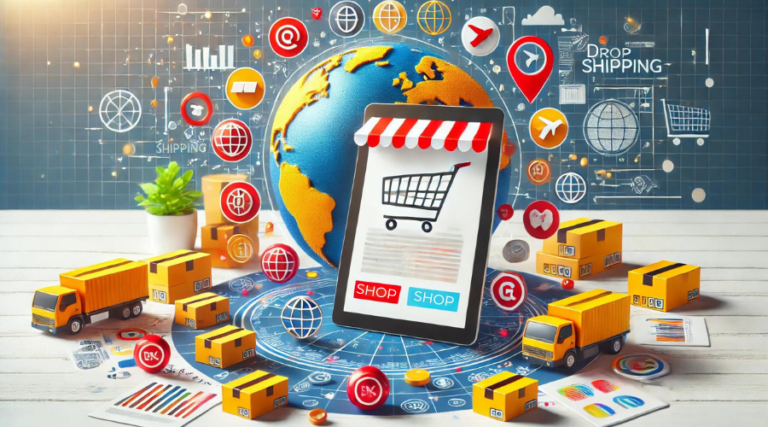Dropshipping Niches to Avoid: A Comprehensive List
Are you pondering over starting a thriving dropshipping venture? While this can be a lucrative business, choosing the right niche is critical. Picking up from where most entrepreneurs who made it big left off, here’s a list of 25 dropshipping niches that you should avoid to increase the chances of your success. Packed with comprehensive information, these insights will serve as your reliable roadmap in your journey.
Contents
- 1. Counterfeit or Knockoff Products
- 2. Hazardous Material and Chemicals
- 3. Medication and Medical Equipment
- 4. Weapons and Ammunition
- 5. Animals and Animal-related Products
- 6. Adult-only Products
- 7. Tobacco Products and Accessories
- 8. Alcoholic Beverages and Kits
- 9. High-Tech Gadgets
- 10. High Fashion Branded Clothing
- 11. Automobiles and Related Parts
- 12. Perishable Foods and Fresh Produce
- 13. Pesticides and Dangerous Goods
- 14. Fireworks and Other Pyrotechnics
- 15. Custom-made or Personalized Items
- 16. Furniture and Large Home Appliances
- 17. Artwork and Unique Collectibles
- 18. High Value Luxury Items
- 19. Copyrighted Material
- 20. Trendy Products with Short Lifespan
- 21. Virtual And Digital Goods
- 22. Multi-Level Marketing Products
- 23. Highly Saturated Categories
- 24. Large or Heavy Items
- 25. Endangered Species Products
- Summing it Up
1. Counterfeit or Knockoff Products
You’re not just looking to do business; you’re seeking to build a reputable brand that resonates well with consumers. Selling counterfeit or knockoff products may seem like an easy way to jump into the fashion or luxury goods market, especially matching user interest on the internet. However, this is a risky proposition and might attract legal issues, damage your reputation, and dilute your marketing efforts.
2. Hazardous Material and Chemicals
Selling hazardous materials and chemicals comes with numerous regulations that vary significantly depending on various geographical locations. Unless you invest large amounts of money and time understanding these regulations, you’re better off avoiding this niche. If not properly handled, especially during shipping, they can lead to disastrous consequences damaging both communication around your brand and your business image.
3. Medication and Medical Equipment

Few industries are as regulated as the health sector. Selling medication and medical equipment requires compliant business processes and often having appropriate licenses. Shipping prescription drugs through the internet is illegal in many jurisdictions—knowing all these makes it clear why beginners in online shopping should avoid dealing with medication and medical equipment in their dropshipping venture.
4. Weapons and Ammunition
The sale of weapons and ammunition operates within strict regulatory environments that vary widely across regions. Given it potentially connects to lethal outcomes, the careful attention it requires far outstrips other online shopping sectors. Avoid this niche unless you’re prepared for the costs associated with safety regulations, legal complexities, and public relations challenges.
Selling animals or certain animal-related products online could land you into hot water due to varying laws governing the treatment of animals across countries. This niche lacks transparency and uniformity in business economics and regulation. It may even attract unwelcome attention from activists and lawsuits if you’re implicated in animal cruelty or illegal animal trade.
6. Adult-only Products
The sales of adult-only products require a meticulously regulated environment, considering it necessitates age verification for customers, which can be quite challenging on the internet. If a minor manages to purchase from your site, your company could face lawsuits and harsh penalties—not to mention potential damage to your brand and marketing image.
7. Tobacco Products and Accessories
Just like medication, weapons, and adult materials, selling tobacco products and accessories online is heavily regulated due to health risks associated with their use. Plus, there are specifications about who can purchase these items. Internet service providers might also put restrictions on websites selling such products, making dropshipping these items more difficult.
8. Alcoholic Beverages and Kits
Drop shipping alcohol involves complicated regulatory landscapes that differ from region to region because underage consumption has severe implications. In most cases, your business could be held liable for any potentially harmful incidents resulting from underage drinking. It’s a high-risk sector—one that’s wisely left to large corporates equipped enough to navigate its many challenges.
9. High-Tech Gadgets
Selling high-tech gadgets may seem like a lucrative venture considering the boom in technology. However, handling warranties, returns, technological updates, and providing adequate customer service can be overwhelming for newbies in the online market. It is also a highly competitive niche where giants like Amazon and BestBuy dominate, making it more challenging for small dropshipping businesses to stay afloat.
10. High Fashion Branded Clothing
Brand association and authenticity play critical roles in high fashion branded clothing. Purchasing from an unauthorized reseller minus the luxury shopping experience can tarnish your perception as a dropshipping retailer. Furthermore, you might find items difficult to source from high fashion brands that prefer dealing directly with customers to ensure they control the customer’s shopping experience-san any HTTP cookie-related complications. This niche can also lead you into selling counterfeit items.
11. Automobiles and Related Parts

When entering the dropshipping universe, it’s wise to steer clear of the automobiles and related parts niche. This sector is regulated by strict customs laws and regulations which can be a nightmare for you. Additionally, these items require special shipping and handling due to their large size and weight – a significant hurdle for dropshippers. As you’re responsible for customer satisfaction in dropshipping, dealing with lost packages or damages in transit can be costly. Finally, customers tend to buy such parts from trusted brands they’ve used before, so breaking into this market would require heavy marketing.
12. Perishable Foods and Fresh Produce
Dropshipping is not suitable for perishable foods and fresh produce. The logistics involved in ensuring timely delivery can be complex and stressful. Remember that freshness is critical, particularly when it comes to consumable products. If a strawberry arrives spoiled or a steak arrives late, it will not only lead to unhappy customers but potentially even health risks and legal complications. Additionally, international boundaries often have stringent rules when it comes to importing commodities such as food.
13. Pesticides and Dangerous Goods
In the realm of dropshipping, certain goods like pesticides are challenging to manage due to their hazardous nature. Most courier companies have regulations against shipping dangerous items as they pose risks during transportation. Also, selling harmful products online could raise issues about liability if something goes wrong. Many jurisdictions have complicated rules concerning the handling of such products, meaning the business economics surrounding this market could rapidly become uneconomical for your service.
14. Fireworks and Other Pyrotechnics
Fireworks and other pyrotechnics may seem like an exciting niche at first glance, but trust me, it’s fraught with countless challenges. Government regulations and strict shipping policies make these, quite literally, dangerous waters to navigate. Necessary permits and safety regulations are essential to legally sell these items. Moreover, the lack of online shopping appeal because customers ideally want to see pyrotechnics in action before buying creates a massive hindrance.
15. Custom-made or Personalized Items
There’s something appealing about offering personalized or unique items as part of your business process. Nonetheless, this route is generally not recommended for dropshipping. This is due to the fact that custom orders take time and direct communication between you and the customer, not mentioning the supplier too. It doesn’t align well with the dropshipping model where you’re not directly in control of the product production or customization.
16. Furniture and Large Home Appliances
Furniture and large home appliances can be an attractive sector, given their high value and demand across households. But this niche might prove to be unsuitable for dropshipping due to reasons like high shipping costs associated with their bulky nature and potential damages during transit. Setting up customer expectations about build time and delivery dates can become tricky due to the variables at play during shipping and handling of these large items.
17. Artwork and Unique Collectibles
Selling artwork and unique collectibles poses a challenge for dropshippers as these items often require careful transport, insurance, verification of authenticity, and appreciation by customers who usually wish to inspect such products personally before buying them online. A simple photograph on your internet service provider won’t do justice showcasing these luxe products’ charm in a mass media platform.
18. High Value Luxury Items
Apart from being challenging to advertise online, high value luxury items like designer handbags or expensive watches are risky investments for a dropshipper. Tricky issues related to insurance, authenticity, and inflated shipping costs can deter your customer growth. Another essential point is that consumers usually prefer purchasing luxury goods from recognized brands or official stores to guarantee quality and genuinity.
19. Copyrighted Material
Avoid selling copyrighted materials such as books, music, and movies in the dropshipping market. Legal complications can arise from carrying these products without a proper license or authorization from the copyright holder. Selling copyrighted material exposes you to legal action and could potentially harm your brand’s reputation.
20. Trendy Products with Short Lifespan

Trending products or those having a short lifespan are tricky for a successful dropshipping strategy. By the time you’ve put in effort for marketing and setting up the supply chain, the trend may pass and leave you with no demand. Plus, such fleeting market demand often leaves little room for establishing long-term relationships with buyers.
21. Virtual And Digital Goods
You may think that digital goods like e-books, plugins or software seem like an attractive option for dropshipping due to their non-tangible nature and ease of delivery. Unfortunately, this particular niche can be problematic. For one, there’s a high chance your customers could find these products for free somewhere else on the internet. Secondly, the fact that they can’t physically ‘touch’ or assess the product might make potential customers hesitant to purchase.
Plus, dealing with potential technical issues that arise from such products can be time-consuming and complex. Ultimately, you need to consider if dealing with these types of issues aligns with your business model and capabilities.
22. Multi-Level Marketing Products
Multi-level marketing (MLM) has generated quite a name for itself in the e-commerce world. MLM products may seem promising due to the wealth of marketing and financial resources behind them – additionally, promoters often highly encourage their network affiliates to buy them.
Nevertheless, these kind of products often come with inflated prices and questionable quality. Also, the business model of MLM often leads to market saturation pretty quickly – making it hard to attract new customers or retain current ones.
23. Highly Saturated Categories
Fashion, Beauty products, and Electronics are categories that may spring immediately to mind when you contemplate your dropshipping options. However, these categories are already incredibly saturated. These niches are dominated by giant retailers who have economies of scale in their favour so they can offer lower prices that you’re not likely able to match.
Finding success in such crowded spaces requires colossal marketing efforts and huge budgets which might exhaust your resources very quickly. It would be wiser investing in less popular but potentially profitable niches.
24. Large or Heavy Items
Large or heavy items like furniture, gym equipment, and so on can cause various challenges in a dropshipping model. First off, shipping bulky or unwieldy items can be a logistical nightmare. This often translates into high shipping costs and longer delivery times – both of which can deter customers.
The risk of products getting damaged during delivery is also far greater with such items. In general, dealing with returns or complaints will be more complicated (and expensive) than if you were selling smaller, lighter products.
25. Endangered Species Products
Selling products related to endangered species (like ivory, certain types of wood or animal skins) is not just morally wrong, it’s also illegal under international law. You might stumble upon these products on some suppliers’ websites, being sold as ‘exotic’ items that could allegedly fetch high profits.
Avoid this niche entirely. Doing business this way will harm your brand’s reputation and could potentially have legal consequences. Remember that being ethical and sustainable in your business practices is more lucrative in the long run.
Summing it Up
Choosing the right dropshipping niche isn’t always straightforward. Stay away from niches like virtual digital goods, multi-level-marketing products, highly saturated categories, large or heavy items, and endangered species products. Make sure to analyse the potential difficulties inherent in each niche before making decisons. Always be ethical and considerate about the impact of what you’re selling on communities and the environment. Done right, dropshipping can be a very lucrative e-commerce model.










